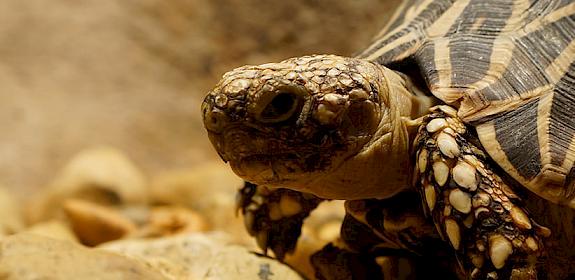TRAFFIC applauds Philippine law enforcers as online trafficker of Critically Endangered Chinese Giant Salamander is convicted.
A court in the Philippines has sent an online trafficker to jail for illegally selling two Critically Endangered1 Chinese Giant Salamanders, marking a significant win against online wildlife crime for the Philippine National Police Anti-Cybercrime Group (PNP-ACG) and the Department of Environment and Natural Resources (DENR).
Illegal wildlife trade is steadily shifting towards digital platforms and online markets and poses a multitude of regulatory, enforcement and conservation challenges. Rapidly evolving technology can give illegal traders and criminal syndicates a level of anonymity never before seen.
In February 2022, Christian Jade Nualla and a partner, both known for illegally selling wildlife online, offered two amphibians on Facebook. The salamanders were delivered to an undercover police officer posing as a buyer. Upon receiving the animals, police conducted a supervised return delivery to Nualla, and he was arrested after receiving the package. Nualla’s partner is still at large.
The Chinese Giant Salamander Andrias davidianus, the largest of all amphibian species, is found only in small numbers in parts of China. Once common, its population has declined tremendously over the past three decades due to commercial over-exploitation for consumption. It is listed on Appendix I of CITES2, which prohibits commercial international trade in this species.
The salamanders in this case were believed to have been purchased from an ornamental fish importing company in the Philippines. The company was found importing aquatic plants, frogs, and turtles without the required permits by the Bureau of Customs on the same day Nualla was arrested. It is not known if charges were filed against the company.
Nualla was charged with violating Section 27e of the Wildlife Resources Conservation and Protection Act (Republic Act No. 9147)3, in relation to Section 6 of the Cybercrime Prevention Act (Republic Act No. 10175)4. This means a penalty one degree higher can be applied to the wildlife offence as it was committed online.
On 16 May 2023, the Regional Trial Court in Valenzuela City convicted Nualla and sentenced him to 4-6 years in prison and PHP300,000 fine (USD5,382). Convicted persons can apply for early release after serving the minimum sentence.
This is one of the highest imposed penalties for wildlife trafficking in the Philippines to date. The use of anti-cybercrime law is noteworthy as wildlife crimes, including illegal online trade, tend to be prosecuted as an offence solely using wildlife, forestry, or natural resources laws.
We congratulate the PNP-ACG and DENR. New approaches like this are increasingly important for Southeast Asia as internet penetration grows in the region and authorities grapple with widespread illegal trade of wildlife online."
Kanitha Krishnasamy, Director for TRAFFIC in Southeast Asia.
Notes:
1 According to The IUCN Red List of Threatened Species™
2 CITES: Convention on International Trade in Endangered Species of Wild Fauna and Flora.
3 Section 27 of the Republic Act No. A 9147: Illegal acts. Unless otherwise allowed …it shall be unlawful for any person to …exploit wildlife resources …; (e) trading of wildlife.
4 Section 6 of the Republic Act No. 10175: All crimes defined and penalized by the Revised Penal Code, as amended, and special laws, if committed by, through and with the use of information and communications technologies shall be covered by the relevant provisions of this Act: Provided, That the penalty to be imposed shall be one (1) degree higher than that provided for by the Revised Penal Code, as amended, and special laws, as the case may be.




